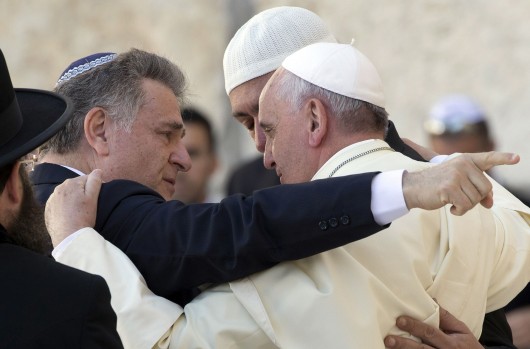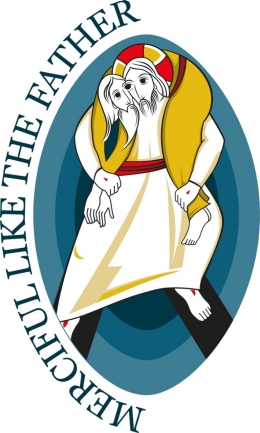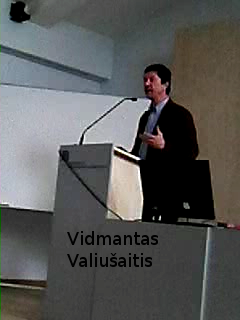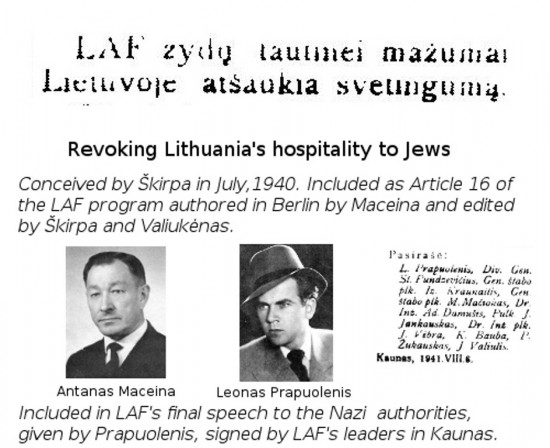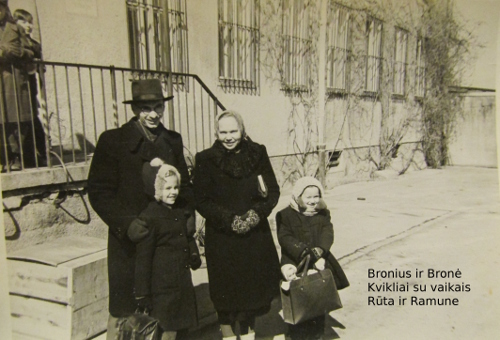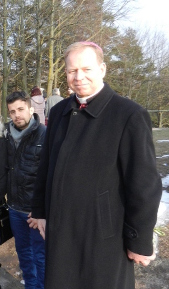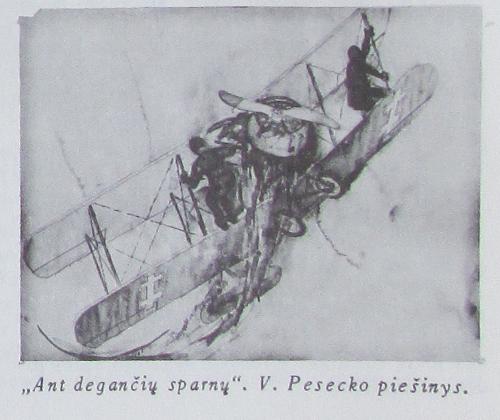CHRISTIAN-JEWISH RELATIONS | EVENTS | BOLD CITIZENS SPEAK OUT
◊
by Andrius Kulikauskas
◊
Editor’s note: The author provides here his own synopsis (with explanatory comments for Defending History readers) of his Lithuanian essay that appeared in Veidas on 5 May 2016. It is in effect an open letter from a Lithuanian citizen to Archbishop Gintaras Grušas on the occasion of the “Jubilee Year of Mercy” events scheduled this week under the title “National Congress of Mercy.”
◊
◊
Holocaust Lessons in the Year of Extraordinary Mercy
◊
Pope Francis declared the year 2016 to be an Extraordinary Jubilee of Mercy. The main event in Lithuania will be the National Congress of Mercy in Vilnius on May 6-8. As a Roman Catholic, I am delighted in Pope Francis’s leadership and wish to be supportive of such events which make my church more inclusive of personal initiative. However, as a Lithuanian, I was struck that none of the six creative events nor 42 discussions was dedicated to fostering friendship with Lithuania’s Jews or drawing lessons on mercy from the Holocaust.
I wrote a letter to Vilnius archbishop Gintaras Grušas with 10 suggestions for how we might empathize with Lithuania’s Jews in this Year of Mercy. I had recently met archbishop Gintaras on the Hill of Three Crosses after Good Friday’s procession. He recalls me from Lithuanian Saturday school which we both attended in Los Angeles, California. I took the opportunity to alert him that what we had learned growing up about the Holocaust in Lithuania was incorrect. He then encouraged me to email him.
On May 5, 2016, the Lithuanian online portal Veidas.lt published my article “Holocaust Lessons in the Year of Extraordinary Mercy”. I would like to share a synopsis of its basic contents with readers of Defending History.
I confess that only after publication did I realize the mistake in my title. I had misconstrued the Extraordinary Year of Mercy as the Year of Extraordinary Mercy. However, this is the kind of inspired mistake which I allow myself to leave be as the work of the Holy Spirit.
I describe the upcoming event and admit that I don’t always fit in as a Roman Catholic. I find it strange how a “national” congress on mercy could be organized without including people of other faiths, including Jews, as well as free thinkers.
I had thought of participating in the discussion to be lead by former President Valdas Adamkus on youth and idealism. I hoped that he and his high school friend Benediktas Mačiuika might speak on behalf of their generation to confirm that Lithuanian patriots had gone horribly astray in wronging Lithuania’s Jews.
I intended to distribute a flyer, a summary of crimes against humanity by Lithuanian leaders in 1940-1941, which I had handed out previously at a talk by Vidmantas Valiušaitis on March 15 at the Vilnius University Institute of International Relations and Political Science about Rūta Vanagaitė’s book Mūsiškiai. Vidmantas Valiušaitis is the director of the Adolfas Damušis Democratic Studies. Adolfas Damušis was an esteemed Catholic intellectual, the Minister of Industry in the Provisional Government, an activist in the Catholic youth movement ateitininkai, who as such was held by the Smetona regime at the concentration camp in Varniai, and who the Nazis imprisoned in Germany.
The Pope had awarded him the Order of St.Sylvester. However, I had discovered that he had signed Leonas Prapuolenis’s final speech which included the infamous 16th article of LAF’s program: “LAF revokes hospitality to the Jewish ethnic minority in Lithuania.” LAF’s program was authored by Catholic philosopher Antanas Maceina in Berlin, and edited by LAF leader Kazys Škirpa and his secretary Antanas Valiukėnas. LAF Kaunas leaders such as Pilypas Narutis have claimed to have never seen this document. However, it forms the basis of LAF Kaunas leader’s Leonas Prapuolenis’s final speech to General Comissar von Renteln on August 6, 1941, after which Leonas Prapuolenis was arrested. This speech was signed by Adolfas Damušis and others in LAF. Unfortunately, it contains that inhuman sentence, a disturbingly polite formulation of ethnic cleansing. The newspaper Islaivintas Panevezietis published the speech on August 14, 1941 in the thick of the Holocaust.
I stood up to ask, how are we to empathize with Jews who might feel hurt that Damušis’s name was chosen for such a democratic studies center? I was concerned that the young students not be misled to think that the Holocaust was perpetrated by the dregs of society, not by Catholic intellectuals or Lithuanian fighter pilots, the most attractive and daring of people. Adolfas Damušis’s daughter, Lithuanian diplomat Gintė Damušytė, my former boss at the Lithuanian Information Center in Brooklyn, New York, informed me that her father was never an anti-semite and there was nothing to apologize for. I agreed that he was not an anti-semite and that there was nothing to apologize for, but yet could she regret that his signature contributed to the Holocaust? I asked in five different ways and she was unable to voice regret but she and Vidmantas understood my point.
I think it helped Vidmantas that I wrote about my own grandfather Bronius Kviklys, the author of a seven volume encyclopedia, “Churches of Lithuania”, who was also awarded a medal by the Pope and is widely respected. It turns out that in 1941 he worked as Secretary for Vytautas Reivytis, the head of Lithuanian Security Police. From 1942 to 1944 they both edited the magazine “Police”. I regret that my grandfather chose to work for Vytautas Reivytis, the man who led the arrest of some 100,000 of Lithuania’s Jews, and who presumably did that in the name of Lithuania, for otherwise some police officers might have helped Jews flee.
As a student in Chicago I had asked my grandfather about Lithuanian culpability in the Holocaust. He explained how he had met a man who had escaped from prison and sought vengeance on all Jews. What could I say to such a man? I told him I would say that revenge is a sin. My grandfather did not like my answer and we talked no more on that subject.
I was thinking of distributing my leaflets at the Congress, but then thought better to write a letter to archbishop Gintaras Grušas. I include my letter at the end of the article.
I am most delighted by the Vatican’s new thoughts on Jews in the Year of Mercy as expressed in the document, “The Gifts and the Calling of God are Irrevocable”, which Dovid Katz alerted me to. It asserts that, historically, Christians have wronged Jews more than Jews have wronged Christians. This is a noteworthy instance of my Church learning a lesson, even though it took 2,000 years. My Church also teaches that Jews do not need to believe in Jesus. Jews are united by living God’s word, and Christians are united by Jesus, the living Word of God, so we are all united by the same God’s word. In fact, Jews are to be thought of as older brothers from whom Christians should learn.
The Pope emphasizes that the Year of Mercy is to be full of dialogue between Christians, Muslims and Jews, all of whom believe in a merciful God, so that we all grow merciful to each other. The Catholic news agency shared a quote by rabbi Naftali Brawer from the Talmud, “whoever is merciful to the cruel will be cruel to the merciful”.
I ask, why is it that Jews did not wrong Christians in the way that Christians wronged Jews? One possible answer is that Jews have more deeply absorbed the Ten Commandments, for example, Thou shall not kill. This commandment also helped Catholic Lithuanians acknowledge certain moral limits whereby they chose to drive Jews out (ethnic cleansing) over killing them (genocide). I quote Finance Minister Jonas Matulionis, LAF leader and Prime Minister Kazys Škirpa, and Lithuania’s leading ambassadors, Stasys Lozoraitis and Petras Klimas.
I also note that we can compare them with some non-Christians. Jonas Pyragius believed that the Vatican was worse than Bolshevism because the concept of God disarms people. He argued that genocide was good in its own right and not to be conditioned on regaining Lithuania’s independence. Zenonas Blynas, the general secretary and intellectual of the Lithuanian Nationalist Party, wrote that there is “never too little” blood for the earth, by which he meant that the earth hungers for the killing of a small, shrieking child. Historian Saulius Sužiedėlis has called the Lithuanian Nationalist Party a gang of organized criminals. Jonas Noreika was the leader of the LNP in all of Žemaitija and a school is named after him. Instead, I suggested that the school be named after his daughter Dalia, who gave baked buns to Jews. I shared an article which I had found in the LNP newspaper in Šiauliai which lets us believe that may have been true. The editorial, “Improper Mercy”, complains that many Lithuanians are tossing bread, apples and cigarettes to Russian prisoners of war, which makes it hard for German soldiers to keep order.
I conclude that mercy is empathy for those who suffer unnecessarily. And it is completely senseless that the innocent suffer, as when Jesus suffered on the cross. It was just as senseless that innocent children, eldery and women suffered. Jews in great numbers died a holy death believing in God to the end. It is no less important to take to memory and take to heart their death then it is is with Jesus’s sacrifice, which we celebrate every day at the Cathedral. He himself would say that wherever a little one suffers, so does he. Blessed are those who are persecuted for the sake of righteousness, who suffer because they are good. Theirs is the kingdom of heaven. But how to find meaning in what happened?
The Holocaust in Lithuania is a living, holy Scripture for from which our nation can learn forever. By the Holocaust we have become a biblical nation which observed the restoration of Israel. Lithuania’s Jews called Vytautas the Great the “Cyrus of Lithuania”, which is to say, the Messiah of Lithuania. And our people revoked his hospitality to that nation whose gifts and calling God will never revoke, as claims the Catholic church. Who among us will revoke this revocation? But each of us revokes it whenever we long for Jews who are no more. When we take responsibility for our past, then we will be able to learn together with Jews and other nations. We will be able to discuss whether Abraham could have refused to sacrifice his son to God. Perhaps Jews could have disobeyed God’s command to kill off the Amalekites.
Our Church learns. It is taught by the Holy Spirit. Jesus teaches: Blessed are the skeptical (the poor-in-spirit), theirs is the kingdom. We can wish to believe God ever less, and rather know and love God ever more. We can wonder if God is perhaps unmerciful?
I am personally disturbed by mother Mary and her protection of fighter pilot Kazys Šimkus. Since childhood he prayed for her protection and she kept him safe in all manner of motorcycle, car and plane accidents. Most spectacularly, in 1928 he and Leonardas Peseckas flew in a biplane whose engine caught fire. They climbed out onto the wings, glided the plane downward and from a height of 10 meters jumped down to safety. This same Kazys Šimkus participated in the coup against Kaunas commandant Jurgis Bobelis and subsequently took charge of the TDA battalion which murdered tens of thousands of Jews. What is the point of mother Mary’s protection if she does not keep him from murder? Why does she not care for those victims who do not call on her? Wouldn’t it be better if she just stayed out of it all?
What should we learn? We have the Ten Commandments, but they are quite vague. Jesus taught how to sharpen one’s personal conscience. But we need a morality to deal with moral quagmires where no matter what we do, we are going to sin in some way. We need a morality to look out for each other in war and Holocaust, to find an honest way to make a living, to not injure our planet, to prepare for global warming and influxes of refugees, to keep believing that we can change our families, countries and Churches. I imagine that we need to behave so that it would be easier for us to forgive each other.
Priest Simonas Morkūnas and the finance minister’s brother, physician colonel Balys Matulionis were both righteous in standing up for Jews on June 28, 1941 after the Lietūkis garage massacre. We only know of them from Kaunas archbishop Juozapas Skvireckas’s diary. They came to him for help. But these two are not known to the Vilnius Gaon Jewish museum, nor to anybody else. Why is that? I think it is because it would bring to light the archbishop’s half-hearted efforts on their behalf. It would also bring out bishop Vincentas Brizgys’s refusal to die as a martyr along with Jews.
If we wish to learn how to behave, then we need to look at ourselves. We thus need to forgive each other our sins.
In conclusion, I share the Lithuanian bishops’ encouragement to practice the deeds of mercy for body and soul. Feed the hungry, nourish the thirsty, clothe the naked, take in the immigrant, heal the sick, visit those in prison, and bury the dead. Teach the ignorant, advise those who waver, comfort the downcast, forbid those who would do wrong, forgive insults, suffer those who hurt us, pray for the living and the dead.
◊
My Letter to Archbishop Gintaras Grušas on May 2, 2016
Dear Archbishop Gintaras,
It was good to talk with you on Good Friday after the stations of the cross. I am glad that you remember me from the Los Angeles Lithuanian parish.
In this Year of Mercy I think that it would be especially fitting to empathize with Lithuania’s Jews:
♦ To appoint a representative of the Church who would foster empathy for Lithuania’s Jews.
♦ To encourage Catholics and those of other faiths and worldviews to come together and learn with the purpose of loving each other and loving God.
♦ To acknowledge how Lithuanians, especially those who voiced our national will, among them renowned Catholic intellectuals, wronged Jews in 1940-1941 in our name and for our benefit.
♦ To investigate and refute the lie spread by Lithuanians that Jews wronged Lithuanians in 1940-1941.
♦ To study how Lithuanians and Catholics were able to sin so grievously. Why is it that for so many decades we chose not to learn from our sins? How can we learn from them and avoid them in the future?
♦ To declare the day of uprising, June 23, 1941, a Day of Reflection, a Day of Conscience or a Day of Empathy and to dedicate it to consideration, how should our parents, grandparents and greatgrandparents have behaved then and how should we empathize with Lithuanians and others today.
♦ To annually remember Jews wronged by the Lithuanian people and the Catholic church, regret these wrongs, and ask God to teach us how to behave rightly.
♦ To revoke the “revocation of hospitality to Jews” made by those who represented Lithuania’s national will .
♦ To consider how the Lithuanian people might in public unity show that for all times we empathize with wronged Jews. For example, we could decide to not renovate the Vilnius Sports Palace, and instead revive the oldest Jewish cemetery, which might be visible from Gediminas’s castle.
♦ To hear out all manner of Jews, not only their community leaders, as to what they would like from Lithuanian Catholics. To consider their wishes and respond.
I add a summary which I intend to distribute at the National Mercy Congress. I also add links to what I have investigated and written up.
I have thoroughly investigated the responsibility of Lithuanian leaders for wrongs against Jews.
I have collected and published many primary sources. I have suggested that the old Vilnius cemetery be returned to Jews.
I ask you to forward this letter of mine to President Valdas Adamkus that he might consider these questions and wisely speak on them at the National Mercy Congress on Saturday, 12:00, at the Vilnius University History Department, Universiteto g. 7, room 211.
